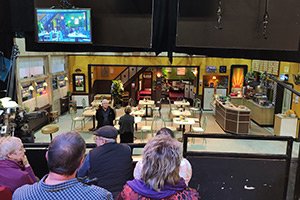More useful tips for making your sitcom script sparkle

In our last piece we discussed some of the simple things you can do to make sure your sitcom script is the best it can be. We covered the importance of a great opening; characters generating story; good structure; quality, sayable dialogue; and rewriting. Here are five more tips to help you on your journey to the perfect sitcom script.
Your script should be relatable
Relatability in a sitcom script can take many different forms.
Perhaps your sitcom revolves around a premise that is easily relatable: office life; home life; the comings-and-goings in a local pub or bar.
Perhaps your script contains characters that remind us of people we've all met; or perhaps it contains one main character - an every-person - who takes us into a world that is more extreme or eccentric.
Either way, it is really important that your script is relatable. That relatability could be more nebulous: a reflection on life, or the human condition. But, even if it contains sharp jokes, a sitcom script needs to connect with its audience on a deeper level.
Your search for originality shouldn't leave you with a piece that is just weird. If you find yourself writing a script that feels very niche and excluding, the truth is - no matter how funny some of the lines are - you will probably need to think again.
Beware formulae
Story formulae. Joke formulae. Formulae for putting together characters, or groups of characters. All these theories can be extremely helpful - but your sitcom script needs to feel like more than 6000 words of well-deployed theory. It must have an organic component; an emotional element, or twist, that elevates it beyond a by-numbers exercise into something more.
By all means, learn and digest the theory - but your script should feel warm and organic, rather than cold and scientific. All successful sitcoms need that sprinkling of magic (that sparkle!) - and that magic cannot be learned on a creative writing course.

Hear it
This won't be possible for everybody, we know, but it might be more realistic than you think. Belong to a local writers' group, or theatre group? Have a friend who's an actor or comedian - or wants to be? Super! Then organise a reading of your script. This will give you both something to aim for, and a chance to hear your words out loud (an experience which, in and of itself, should spur you on and reignite any flagging enthusiasm).
Even if the performers aren't particularly good, the reading will give you plenty of opportunity to assess the quality of your work - is it funny enough? Are the characters consistent? Do the storylines pay-off satisfactorily? - which can be enormously helpful when you come to your next rewrite (and there will, at this stage, be a next rewrite).
Be prepared to answer questions
As you move through the redrafting process - and start to encounter script editors, producers and possibly actors (particularly if you embrace the suggestion above) - you will need to answer questions about your script.
These question will pertain to everything: from the characters and stories, to how you see your new show progressing. Will one of the characters develop a love interest? What do you see future episodes looking like? Have you got an idea for a series arc? Be open to these questions, rather than irritated by them; if the questions seem difficult, it might be because you don't have an answer - and need to develop one.
Crucially, you will need to be reasonable. This can be hard, particularly under the pressure of production - or when you're in rehearsal and dealing with an actor who is wanting to change their lines. But, by engaging reasonably, you will be able to build your network of contacts and improve your script. It's important, however, to...
Learn who - and what - to listen to
Not all feedback is equal. When receiving notes, be careful who you listen to. You can rely on some people to spot a problem, but unless you're talking to someone who you really trust, don't feel you have to do what they suggest. Treat their views constructively, yes, but use them more as an opportunity to honestly reassess rather than a trigger for immediate change.
Sometimes you will receive notes from different sources that seem to contradict each other. When this happens, accept that there is a problem, but don't try to deliver the impossible. Remember: you cannot please everyone. And when we talk about the "perfect script", the truth is, with any script, some people will think it's wonderful, whilst others won't be keen. That's just life, unfortunately - and you need to accept it.
We hope this has been helpful - and we'll have more for you very soon.
This article is provided for free as part of BCG Pro.
Subscribe now for exclusive features, insight, learning materials, opportunities and other tools for the British comedy industry.


